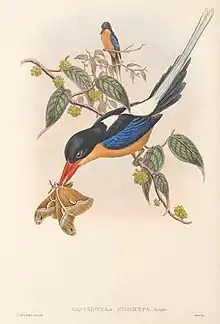| Black-capped paradise kingfisher | |
|---|---|
 | |
| Scientific classification | |
| Domain: | Eukaryota |
| Kingdom: | Animalia |
| Phylum: | Chordata |
| Class: | Aves |
| Order: | Coraciiformes |
| Family: | Alcedinidae |
| Subfamily: | Halcyoninae |
| Genus: | Tanysiptera |
| Species: | T. nigriceps |
| Binomial name | |
| Tanysiptera nigriceps Sclater, PL, 1877 | |
The black-capped paradise kingfisher (Tanysiptera nigriceps) or black-headed paradise kingfisher, is a bird in the tree kingfisher subfamily, Halcyoninae. It is native to several islands in the Bismarck Archipelago to the east of New Guinea. Like all paradise kingfishers, this bird has colourful plumage with a red bill and long distinctive tail streamers.
Taxonomy
The first formal description of the black-capped paradise kingfisher was by the English lawyer and zoologist Philip Sclater in 1877. He coined the current binomial name Tanysiptera nigriceps. The genus Tanysiptera had been introduced by the Irish zoologist Nicholas Aylward Vigors in 1825.[2] The name Tanysiptera is from classical Greek tanusipteros meaning "long-feathered". The specific epithet nigriceps is from the Latin niger for "black" and -ceps for "head".[3] The black-capped paradise kingfisher has sometimes been considered as a subspecies as the buff-breasted paradise kingfisher (Tanysiptera sylvia).[4][5]
There are two subspecies:[6]
- T. n. leucura Neumann, 1915 – Umboi Island in the Bismarck Archipelago
- T. n. nigriceps Sclater, PL, 1877 – New Britain and Duke of York Island in the Bismarck Archipelago
Description
The black-capped paradise kingfisher is 35–48 cm (14–19 in) in overall length including the tail streamers and weighs from 43 to 74 g (1.5 to 2.6 oz). The sexes are alike. The adult of the nominate race has a black head, nape, ear-coverts and scapulars. The mantle, rump and two central tail feathers are white. The wings and outer tail feathers are blue. The underparts are a pale yellowish buff. The bill and feet are orange. The subspecies T. s. leucura differs only in having completely white tail feathers.[5]
References
- ↑ BirdLife International (2016). "Tanysiptera nigriceps". IUCN Red List of Threatened Species. 2016: e.T22725840A94903402. doi:10.2305/IUCN.UK.2016-3.RLTS.T22725840A94903402.en. Retrieved 12 November 2021.
- ↑ Vigors, Nicholas Aylward (1825). "Observations on the natural affinities that connect the orders and families of birds". Transactions of the Linnean Society of London. 14 (3): 395–517 [433]. doi:10.1111/j.1095-8339.1823.tb00098.x.
- ↑ Jobling, James A. (2010). The Helm Dictionary of Scientific Bird Names. London, United Kingdom: Christopher Helm. pp. 271, 379. ISBN 978-1-4081-2501-4.
- ↑ Fry, C. Hilary; Fry, Kathie; Harris, Alan (1992). "Buff-Breasted Paradise Kingfisher". Kingfishers, Bee-eaters, and Rollers. London: Christopher Helm. pp. 118–119. ISBN 978-0-7136-8028-7.
- 1 2 del Hoyo, J.; Collar, N.; Kirwan, G.M. "Black-headed Paradise-kingfisher (Tanysiptera nigriceps)". In del Hoyo, J.; Elliott, A.; Sargatal, J.; Christie, D.A.; de Juana, E. (eds.). Handbook of the Birds of the World Alive. Lynx Edicions. Retrieved 19 May 2017.
- ↑ Gill, Frank; Donsker, David, eds. (2017). "Rollers, ground rollers & kingfishers". World Bird List Version 7.1. International Ornithologists' Union. Retrieved 17 May 2017.
Further reading
- Bishop, K.D.; Jones, D.N. (2001). "The montane avifauna of west New Britain, with special reference to the Nakanai Mountains". Emu. 101 (3): 205–220. doi:10.1071/mu00065. S2CID 82733396.
- Gilliard, E.T.; LeCroy, M. (1967). "Results of the 1958-1959 Gilliard New Britain Expedition. 4, Annotated list of birds of the Whiteman Mountains, New Britain". Bulletin of the American Museum of Natural History. 135 (4): 173–216 [203]. hdl:2246/1986.
- Hartert, Ernst (1926). "On the birds of the district of Talasea in New Britain". Novitates Zoologicae. 33: 122–145 [134–135]. doi:10.5962/bhl.part.21145.
